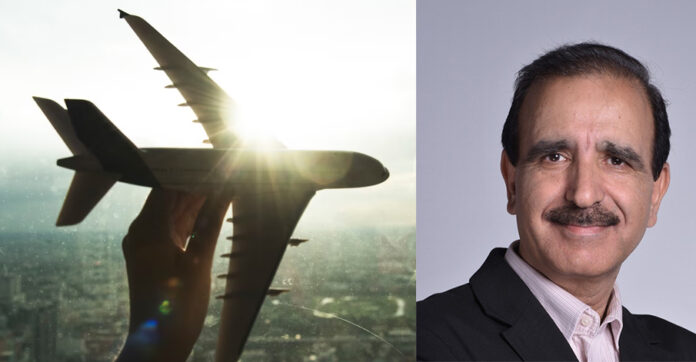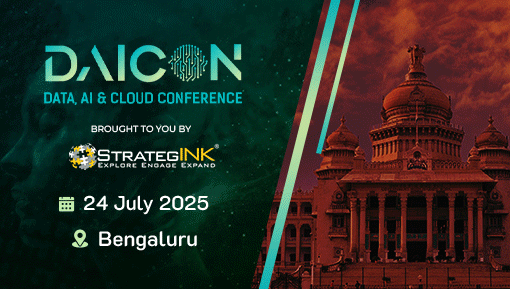
In the fast-paced realm of aviation, the convergence of data and artificial intelligence (AI) heralds a new era of innovation and efficiency. Vinod Bhat is currently the Chief Information Officer (CIO) at Vistara Airlines, with over three decades of unparalleled technology and business leadership expertise. In this article, he navigates us through how transformative technologies reshape every aspect of aviation – from optimizing flight operations and enhancing safety to revolutionizing passenger experiences. He has consistently propelled organizations towards excellence, earning accolades as one of the Top Global CXOs.
Q1. What technology trends do you see shaping the future of the airline industry?
The aviation industry is experiencing a rapid digital revolution, marked by cutting-edge digital solutions with an emphasis on a Data-first approach and AI-driven innovations. The goal is to optimize Business & Infrastructure operations, enhance Customer & Employee experience and improve business KPIs. Touchless and immersive experiences have become crucial imperatives, focusing on automated services and self-service technologies that redefine air travel.
Several advanced technologies are pivotal in this transformation across the aviation value chain. Biometric technologies, such as facial recognition, IoT, RFID, and Blockchain, are facilitating seamless e-boarding, self-baggage drops, smart baggage tracking, and smart kiosks. Facial recognition biometrics have replaced traditional boarding passes, ushering in a seamless and touchless journey. Smart kiosks and the implementation of technologies like DigiYatra are fortifying airports with biometric capabilities, providing a complete touchless customer experience where the face becomes the boarding pass. Bio-metric technologies are leveraged to elevate Employee Experience as well.
Simultaneously, emerging technologies like AR/VR/MR/XR/Metaverse, 5G, and Edge Computing are poised to transform airline operations substantially. The day is not far when the new airport stations will be launched for customers through Metaverse, to give them an immersive experience, even before their actual travel. IoT-enabled sensors optimize predictive maintenance, while Blockchain enhances security and streamlines supply chains. The aviation sector leverages the power of AI, ML, and Big Data to make data-driven decisions. AI algorithms optimize flight routes, create new routes, and enhance fuel efficiency, while ML analyzes data for predictive maintenance, crew scheduling, and hyper-personalization for customers.
Employee collaboration platforms are taking center stage, with three broad objectives – Improve productivity, elevate experience and enhance digital quotient. Despite challenges related to data privacy and workforce upskilling, the future of the aviation industry appears promising as technology integration advances. Air travel is becoming safer, more efficient, and enjoyable for passengers, paving the way for a sustainable and digitally-driven future. The aviation industry is leading the way in this technological evolution, reshaping businesses in India and setting new standards of excellence in customer-centric travel experiences.
Q2. How do you foresee data analytics and artificial intelligence being leveraged to improve operational efficiency, employee & customer experience?
Data analytics, insights and artificial intelligence (AI) are pivotal in driving operational efficiency, managing flight disruptions better, employee engagement, and customer experience in the aviation sector. Focus areas include Engineering & Flight safety, Commercial & Flight Operations, Customer identification & targeted marketing campaigns for personalization, employee onboarding, up-skilling & collaboration and so on. AI algorithms optimize existing flight routes, create new routes, and help build fuel efficiency, while ML analyses data for predictive maintenance, crew scheduling, hyper-personalization for customers, etc. These technologies empower hyper-personalization of services to customers, enhancing their overall flying experience. At Vistara, we are embracing AI-driven solutions, which aligns with the airline’s commitment to stay at the forefront of technological advancements, ensuring a data-driven approach to decision-making. The impact extends beyond customer experiences, as Vistara actively focuses on upskilling its workforce to leverage these technologies effectively. By embracing data analytics and AI, Vistara aims to set new standards of excellence in the aviation industry, fostering a seamless and digitally-driven future.
Q3. How is the industry managing IT & Cybersecurity Infrastructure, supporting critical airline systems?
Airlines prioritise cybersecurity and IT infrastructure to ensure the highest level of security for their operations and customer data. This has led to significant transformations within the aviation sector, facilitated by technologies such as IoT sensors for continuous aircraft systems tracking, blockchain for monitoring customer luggage and freight, and improvements in passenger identity verification, automated payments, loyalty programs, and more.
In the context of Vistara, the airline has implemented cutting-edge tools such as XDR, SIEM, SOAR, PAM, and IGL, showcasing its commitment to safeguarding critical airline systems. Vistara has established a robust foundation for secure and efficient operations by investing in digital technologies and infrastructure. The airline actively focuses on automating processes, streamlining operations, analytics & insights for effective decisions and increasing efficiency across different departments to support its growth trajectory.
Vistara’s digital center of excellence continually evaluates and integrates modern technologies into business processes, striking a balance between adopting new technologies and ensuring the reliability of existing systems. This proactive and balanced approach is crucial for maintaining stability and reliability while embracing technological advancements. As the aviation industry undergoes rapid technological evolution, Vistara’s strategic process involves the gradual integration and testing of new technologies, conducting pilot projects, and collaborating with reliable technology partners to ensure ongoing support and expertise during integration. This commitment to technological innovation ensures that Vistara remains at the forefront of the aviation industry’s digital transformation, delivering an exceptional customer experience.
Q4. How can technology improve the productivity of engineering maintenance staff?
Vistara is one of the first India-based Airlines to introduce QR-based authorization for engineers. It has tremendously helped in automation and improved productivity. Vistara has embarked on Augmented Reality (AR) and Virtual Reality (VR) technologies to enhance the training of engineering maintenance staff. The airline aims to significantly improve workforce efficiency and effectiveness by incorporating AR and VR into training programs. These technologies can potentially revolutionize how maintenance staff acquire and apply their skills, leading to more streamlined and productive operations. Additionally, Vistara acknowledges the possibilities of Metaverse and Digital Twins, anticipating that these innovations will further enhance customer experience maintenance capabilities and reduce operational costs. The airline is committed to exploring and integrating these technologies to stay ahead in the aviation industry’s technological evolution. As the global aviation industry commits to reaching net-zero carbon emissions by 2050, Vistara emphasizes digitalization to reduce paper usage; we have partnered with Ultramain ELB systems to introduce an E-tech logbook solution (currently in the airborne stage). We have recently deployed Aerowash technology for aircraft exterior cleaning, further underscoring our commitment to sustainable aviation. This mechanized cleaning process enhances efficiency, reduces the carbon footprint, and ensures cost-effectiveness by achieving superior cleaning results with minimal water usage.
This commitment to technological advancement reflects Vistara’s dedication to operational efficiency, delivering customers a seamless and personalized experience, and ensuring sustainable operations.
Q5. What innovative technologies are being implemented for environmental impact reduction, like fuel efficiency and sustainability initiatives?
Vistara has been unwavering in its dedication to sustainable aviation since its inception, aligning with the ‘Fly Net Zero’ initiative set by the International Air Transport Association (IATA) to achieve net-zero carbon emissions by 2050. Earlier this year, we achieved a significant milestone by becoming the first airline in India to operate a wide-body aircraft using Sustainable Aviation Fuel (SAF) on a long-haul route. The groundbreaking ferry flight from Charleston to Delhi utilized a blend of 30% SAF and 70% conventional jet fuel, reducing approximately 150,000 pounds of CO₂ emissions over the fuel’s life cycle. Furthermore, we pioneered a domestic commercial flight on a wide-body aircraft using SAF, marking another first for an Indian carrier.
In collaboration with the Tata group’s airline companies, Vistara has signed a Memorandum of Understanding (MoU) with the Council of Scientific and Industrial Research – Indian Institute of Petroleum to jointly explore research, development, and deployment of sustainable aviation fuels (SAFs) for a low-carbon future.
Our current fleet is equipped with cutting-edge technologies and advanced systems, leading to reduced engine noise and lower carbon dioxide emissions. Utilizing new-generation aircraft significantly contributes to maintaining low CO2 levels and achieving enhanced fuel efficiency. Vistara’s commitment to sustainability was further recognized when we received Asia’s 3rd Youngest Aircraft Fleet Award 2023 from ch-aviation, acknowledging our young, modern, and fuel-efficient fleet.
In our pursuit of sustainability, Vistara has adopted the Aerowash technology for aircraft exterior cleaning. This mechanized cleaning process enhances efficiency and reduces carbon footprint while being cost-effective. It allows us to save resources, prevent structural damage and improve fuel efficiency by reducing aerodynamic drag.
Beyond our operational practices, our corporate office exemplifies green initiatives with an IGBC LEED platinum certification. The office harnesses renewable and solar energy sources, practices rainwater harvesting, and incorporates an Organic Waste Composter. Our IT team has also spearheaded an e-waste recycling program, ensuring responsible electronic waste management.
Vistara’s steady focus on product and service innovation, sustainable practices, and operational efficiency has positioned it competitively.






